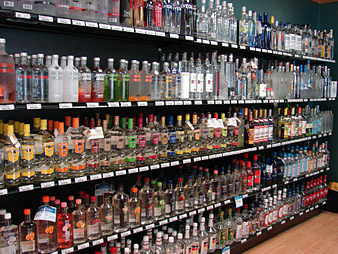It’s Time to Repeal Clarksville’s Good Ol’ Boys’ Liquor Store Permit Law
 Clarksville, TN – The Tennessean recently reported that certain folks in Clarksville are questioning the merit of having a limit of only a dozen liquor stores that can be allowed to legally operate in Clarksville at any one time.
Clarksville, TN – The Tennessean recently reported that certain folks in Clarksville are questioning the merit of having a limit of only a dozen liquor stores that can be allowed to legally operate in Clarksville at any one time.
The out-dated fifty-year-old city ordinance has created an artificial market for “certificates of compliance,” not to mention creating in the local liquor market an oligopoly (the market condition that exists when there are few sellers, as a result of which they can greatly influence price and other market factors).
Both the local liquor oligopoly and the market for “certificates of compliance” hurt Clarksville’s local economy.
Residents of Clarksville don’t have to be reminded that the city’s local government is its greatest barrier to economic progress. What should Clarksville residents do, then, about this archaic local law?City Councilman Joel Wallace (to whose campaign I contributed in the last election, I should say, in the interests of full disclosure) and his fellow Councilwoman Deanna McLaughlin have both questioned the merits of the ordinance. As the Tennessean reported, Ms. McLaughlin “tried to pass an ordinance in 2012 getting rid of the limit,” and has “said she would be in favor of either writing a specific process or forgoing the limit altogether.” I think eliminating the limit altogether would be the best course of action for Clarksville.
The city’s ordinance, as the Tennessean reported, is so antiquated and obsolete, it even includes language specifying that liquor stores cannot sell “any alcoholic beverages on credit.” The law means store credit, but without clear legal language hardline anti-alcohol lawmakers might try to interpret that as a prohibition against using credit cards at liquor stores.
Here are some more outmoded restrictions included in the law:
- Where liquor stores can be in relation to roadways;
- How many doors a liquor store can have;
- Who can own liquor stores;
- Only a U.S. citizen and a resident of Clarksville for at least two years can sell liquor in the city; and
- The age of liquor store employees.
As the Tennessean reported, “the only thing the law specifies for the compliance process is that it must be signed by the mayor.” I’m sure residents of Clarksville during the last fifty years can look back at our former mayors and feel confident that there has never been any question about the ethics or integrity of those individuals.
All sarcasm aside, let’s look at the economics of this law for just a moment. Please forgive me, but I am going to apply to oligopolies a few things said about monopolies by U.S. Court of Appeals for the Seventh Circuit Judge Richard Posner, who literally wrote the book on Economic Analysis of Law, because, in my legal and academic opinion, the statements are applicable. If you disagree, fine; but I hope most of you will indulge me.
“The possibility of entry [into a monopoly or oligopoly] may seem to make monopoly [or oligopoly] an academic concept. Since [an oligopoly] return is greater than a competitive one, sellers in competitive markets will gravitate to a market where a monopoly price is being charged. To obtain some of the [oligopoly] profits in that market, the new entrant must sell, and his sales will increase the output of the market, causing price to fall. Most [oligopolies] thus contain the seeds of their own destruction. But sometimes entry takes a long time, or is forbidden, or the new entrant is not able to produce at as low a cost as the existing firm[s], at least initially (because of the learning curve). But the rate at which new firms enter a market in which [an oligopoly] price is being charged is critical. If the [oligopolists have] a patent or other legal [oligopoly], that rate may be zero and the [oligopoly] price will persist until the legal [oligopoly] ends.” (Posner, R. A. (2007). Economic analysis of law. Austin, Tex: Wolters Kluwer for Aspen Publishers.)
In summary, because people who have to compete in competitive markets want to be able to charge higher prices, they will seek opportunities to enter into monopoly or oligopoly markets. The higher prices that businesses in monopoly or oligopoly markets can charge, because there is little or no competition, attract people from more competitive markets. This is usually a good thing, because the lure of higher prices draws in competitors who then have to sell goods and services in the formerly-monopoly or formerly-oligopoly market, and that has the effect of driving down prices.
The government wants prices to be high for at least two reasons. First, when prices are higher, demand is lower. That means, the higher the price is on liquor, the less liquor will be consumed. In Clarksville, for example, higher prices on liquor might be a great thing for providers of lower-cost alternatives, like beer, and the people who are friends and business associates with, for example, beer distributors and other people in the beer business.
Second, the city profits more from its 5% “inspection fee” that, according to the Tennessean, “gives the city 5 percent of the total amount each liquor store spent on purchasing alcoholic beverages each month. The city collected $637,000 in the last fiscal year and plans on collecting $610,000 next year, according to Laurie Matta, finance director for the city.” Oh, and by the way, you’re a fool if you think the liquor stores aren’t passing on that 5% “inspection fee” (read: “tax”) to their customers.
With all the other quality controls that are part of the liquor production and distribution business, are you really willing to pay 5% more for every bottle of liquor you buy to make sure it’s “inspected” by the city? What are they inspecting, exactly, that is worth a tax of $637,000 in a single year?! That’s $637,000 that could have remained in the pockets of Clarksville’s citizens, that could have been spent in the local economy, but was instead collected by the city and spent on the city’s budget.
These “certificates of compliance” should not exist. The entire system needs to be scrapped. There is no reason to have an artificial market for “certificates of compliance,” nor is there any reason to restrict the local competition in the liquor store business.
I urge you, dear reader, to call your city Councilman or Councilwoman, and ask them to propose and support a new city ordinance repealing the 1963 ordinance in its entirety. It does not need to be repealed and replaced with new regulations. It just needs to be repealed. Period. The free market is more than capable of regulating the number of liquor stores that can exist in Clarksville. The city government has more important things to worry about than the number of liquor stores in town, like bringing vitality back to downtown, curbing urban blight, and improving traffic flow around town.



